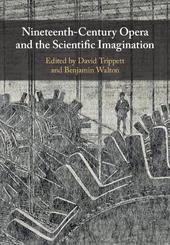
|
Nineteenth-Century Opera and the Scientific Imagination
Paperback / softback
Main Details
Description
Scientific thinking has long been linked to music theory and instrument making, yet the profound and often surprising intersections between the sciences and opera during the long nineteenth century are here explored for the first time. These touch on a wide variety of topics, including vocal physiology, theories of listening and sensory communication, technologies of theatrical machinery and discourses of biological degeneration. Taken together, the chapters reveal an intertwined cultural history that extends from backstage hydraulics to drawing-room hypnotism, and from laryngoscopy to theatrical aeronautics. Situated at the intersection of opera studies and the history of science, the book therefore offers a novel and illuminating set of case studies, of a kind that will appeal to historians of both science and opera, and of European culture more generally from the French Revolution to the end of the Victorian period.
Author Biography
David Trippett is University Senior Lecturer at the University of Cambridge. His first monograph, Wagner's Melodies (Cambridge, 2013), examines the cultural and scientific history of melodic theory in relation to Wagner's writings and music. He recently co-edited the Companion to Music in Digital Culture (Cambridge, forthcoming) and produced a critical reconstruction of Liszt's opera, Sardanapalo for the Neue Liszt Ausgabe, which he orchestrated for Schott. Benjamin Walton is University Senior Lecturer at the University of Cambridge, and a Fellow of Jesus College. His monograph, Rossini in Restoration Paris: The Sound of Modern Life (Cambridge) was published in 2007, and a collection of essays entitled The Invention of Beethoven and Rossini (2013) was co-edited with Nicholas Mathew. From 2014-18 he was co-editor of Cambridge Opera Journal.
Reviews'There is an interesting discussion of whether opera was beneficial or dangerous for the mentally ill. This exploration of the intersection of two important aspects of 19th-century Western life will interest scientists and musicians alike.' R. Pitts, Choice
|